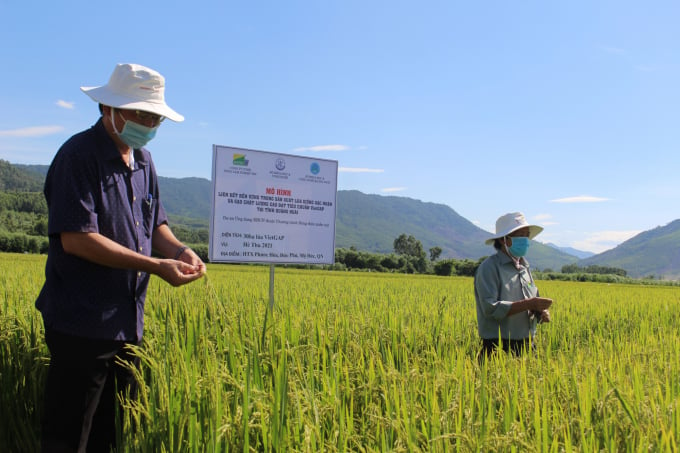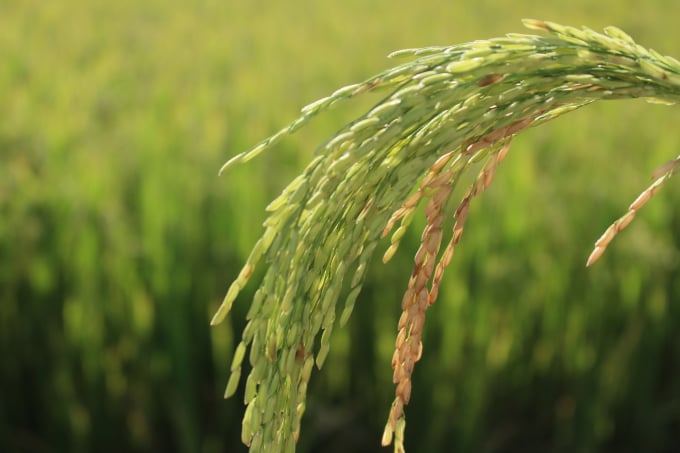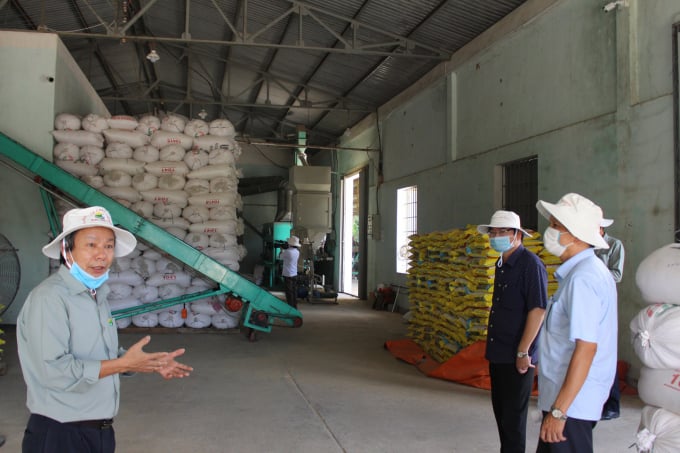November 25, 2025 | 12:01 GMT +7
November 25, 2025 | 12:01 GMT +7
Hotline: 0913.378.918
November 25, 2025 | 12:01 GMT +7
Hotline: 0913.378.918

The model of rice production according to VietGAP standards in Quang Ngai province is well received by farmers. Photo: N.D.
This is seen in the project Applying science and technology to develop a sustainable linking model for the production of certified rice seeds and high-quality rice that complies with VietGAP requirements in Quang Ngai province. The project is scheduled to begin in May 2020 and conclude in April 2023.
In the summer-autumn harvest of 2021, the Phuoc Hoa Cooperative in Quang Ngai province joined the initiative, contributing 30 hectares of rice grown according to VietGAP standards and 10 hectares of certified rice seeds. Paddy is anticipated to provide a good yield.
According to La Thi Thu, a project participant, this is the second crop she has grown under the VietGAP standard. She was first taught and supervised by technical personnel to put the production method into reality, and she has since experienced many advantages from VietGAP rice production.

Rice production according to VietGAP standards not only reduces investment costs but also brings high productivity. Photo: L.K.
From planting sparingly to applying nutrients in a balanced manner to assist the rice plant in hardening the stem, producing strong branches, and reducing pests and illnesses. More significantly, it contributes to the protection of the environment and the health of farmers.
According to Thu, the family has saved a lot of money by avoiding using pesticides and using less fertilizer than before. Rice yields are also very high.
Farmers were ecstatic after the evaluation of the actual yield of the winter-spring crop 2020-2021 in production models using two rice varieties, Bac Thinh and KD28, which both produced. Bac Thinh rice variety produced an average of 71 quintals per ha using the verified rice seed production model, whereas KD28 rice produced an average of 69.2 quintals per ha using the confirmed rice seed production model. Bac Thinh rice yielded almost 70 quintals per hectare under the VietGAP rice production model, whereas KD28 rice yielded 67.5 quintals per hectare.
Profitability is about VND 36-39 million per hectare with the aforesaid productivity, an improvement of approximately VND 15-17 million per hectare above the field control. Not only that, farmers who participate in the model receive 50% of seeds, partially invested fertilizers, and plant protection medicines in the event of epidemics or pests.

Farmers participating in the model are entitled to all products at a high price, so they do not worry about the output. Photo: L.K.
Pham Van Thi, Chairman of the Board of Directors of TBT Quang Ngai Agro-Forestry Company, which is responsible for the project's implementation, explained that the project generated 2,000 tons of rice seed in the first harvest. On average, the firm purchases between 8 and 10 tons of fresh rice per hectare for farmers, with some individual households purchasing up to 11 tons per hectare. All production in the project's winter-spring crop 2021 is 100 percent standard.
"We are now pursuing the combined production and consumption of products for farmers in the summer-autumn crop of 2021. This crop is expected to generate between 8 and 8.5 tons per hectare, "Thi said.
According to Nguyen Van Thanh, Director of the Quang Ngai province's Department of Science and Technology, the rice production method was transferred after two seasons of project execution, initially obtaining extremely good results, high yield, and high grain quality.
Seeds are processed, packaged, and kept cold to ensure they satisfy strict quality standards, and rice is produced in accordance with the VietGAP process.
“Rice produced in accordance with VietGAP guidelines is both cost-effective and environmentally friendly, especially when farmers do not use chemical fertilizers as they did in the past. Production ensures that rice is clean and of a high grade. Economic value per hectare rose by 20% as compared to conventional agriculture. It is critical to protect both consumers and farmers' health,” Thanh stated.
Translated by Samuel Pham

(VAN) The information was shared at the seminar 'Urban Agriculture - Solutions for Developing Green Spaces,' organized by the Kinh te & Do thi Newspaper and the Biotechnology Center of Ho Chi Minh City.
/2025/11/19/4141-2-132831_216.jpg)
(VAN) One of Japfa's outstanding solutions is implementing digital transformation and artificial intelligence (AI) to optimize operations, enhance productivity, and advance sustainable development.
/2025/11/19/4847-1-093540_448.jpg)
(VAN) The Gia Lai Provincial People’s Committee had a working session with the delegation of the U.S. Department of Agriculture, the State of Idaho, and representatives of the State's leading enterprises.

(VAN) Ca Mau has a sufficient foundation to become a strong regional aquaculture center, where production integrates the economy, the environment, and the lives of the people.

(VAN) SEIKI Group envisions itself as a pioneer in the ‘dual transformation’ of digital technology and green industry, standing alongside the Government and Vietnamese businesses in their pursuit of sustainable development.

(VAN) The VNGEONET network affirms Viet Nam's progress in mastering digital space, providing a precise positioning data platform to serve socioeconomic development.
/2025/11/14/3247-1-184556_35.jpg)
(VAN) Thai Nguyen is methodically implementing digital transformation in the livestock sector, laying the foundation for a modern, transparent, and sustainable agriculture.